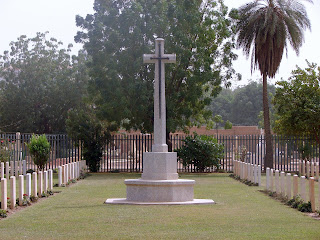
The fenced compound was well maintained, the tombs and vaults built in marble systematically laid out to aptly reflect marked reverence held for the heroes. While sauntering across, quickly reading through the epitaphs, the words "Om Bhagavate Namah" caught my eyes. The tombstone belonged to Sapper Appalaswami of Madras Sappers. The names of more Indian soldiers were etched on a huge memorial wall along with other officers and men whose bodies could not be identified. One felt truly proud of the valour displayed by our soldiers in an alien land and respect for the British system which valued the lives of each of its men and honoured their memory without bias or prejudice.

Let us briefly delve on what Appalaswami and his comrades did in Sudan. Italy's entry into the War in June 1940 threatened the British rule in Egypt and close the Mediterranean trade routes to Egypt, India and Australia. In early July the Italian East African Garrison launched attacks on the borders of Sudan and Kenya, supported by the Naval and air bases in Eritrea. By early 1941, the Commonwealth air force had attained parity with the formerly preponderant Italians. Around the same time, the three British Battalions and the small Sudan Defence force in Northern Sudan were joined by the fourth and fifth Indian Divisions (better known for its campaigns in Burma and Malaya later in the war). The frontiers were crossed on 19th Jan 1941 and the Indians overcame the Italians in Agordat and Barentu and overcame some strong resistance in Keren, thus paving way for the capture of Asmara and Massawa (Eritrea) by April. ( The Fifth Division then fought the Germans in Libya and moved to Iraq to protect the oil fields. The Fourth Division fought in Syria, Palestine, Cyprus, Italy and Greece).
During WW-II, Indian personnel received 4000 gallantry awards including 31 Victoria Crosses (highest gallantry award). The fact that the only VC winner from elsewhere in the Empire was Corporal Sefanaia Sukanaivalu of the Fiji Military Forces, speaks volumes about the Indian soldier.
Many must be wondering as to why so much veneration should be showered on the men who fought for a foreign monarchy. Others might be trying to speculate as to what motivated these men to fight in a distant land, away from kin for such a prolonged period for no cause of theirs. The mystery lies in the virtues of thorough regimentation that existed in the Indian Army. The prime cause in a soldier's mind had little to do with National or Strategic issues ..... it has all to do with the honour of the regiment, faith in their leader and respect for the fallen comrades.
The Indian Soldier definitely retains these traits to this day. However, the socio-economic changes in civil society and generational shift towards more practicable soldiering have brought about a dilution in these values. As a Nation we must learn to value the lives of every citizen in general and our soldiers in particular. Even while adapting to new technology and doctrines, our leaders and policy makers need to be awake to the need of preserving the quality of uniformed men, lest we loose our edge in combat.
